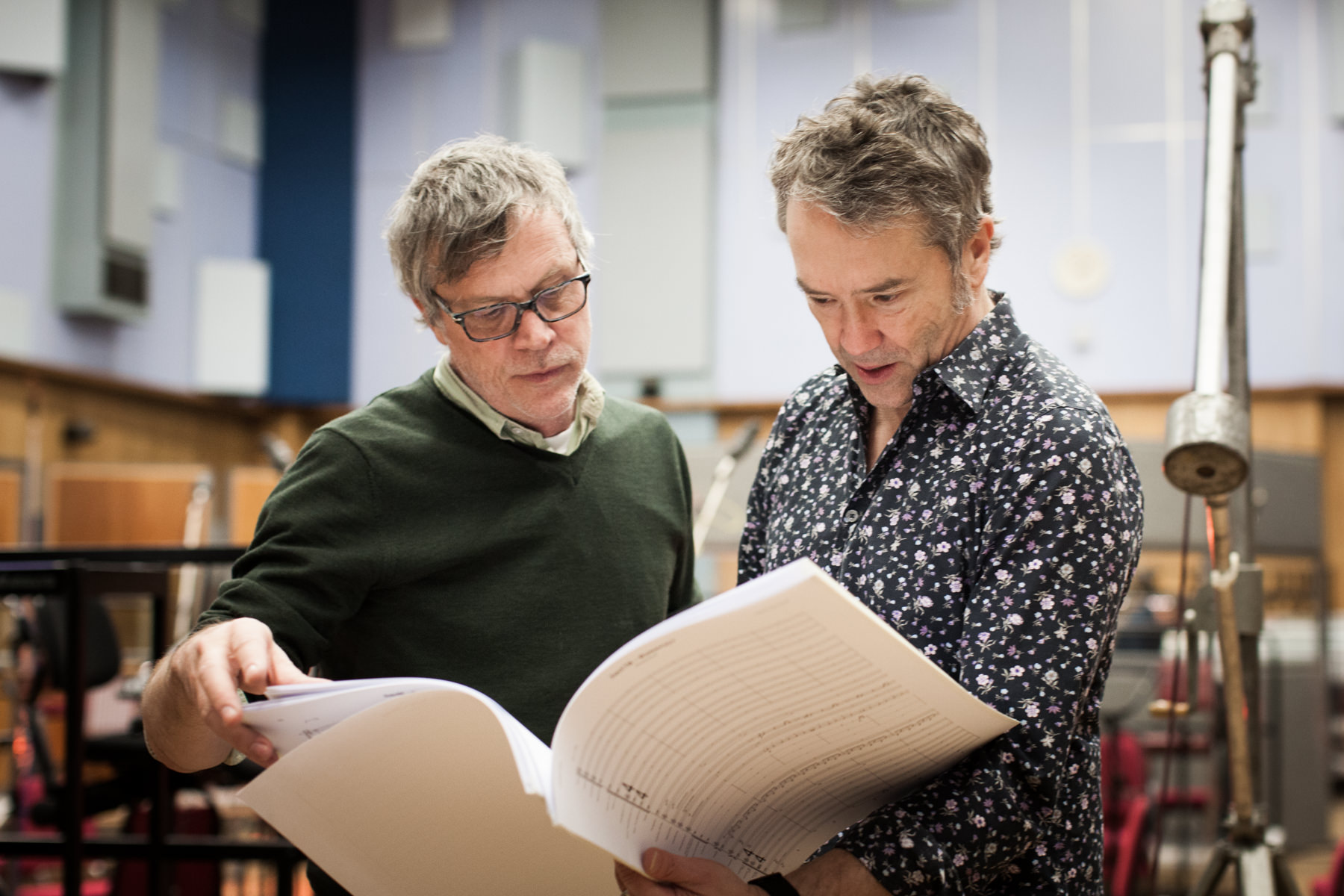Composer Carter Burwell Orchestrates Emotions for Music-Filled Wonderstruck
Carter Burwell scored 15 movies for the Coen Brothers, composed music for three Spike Jonze films and picked up an Oscar nomination for the lush score he wrote for Todd Hayne’s fifties-era melodrama Carol. But in terms of sheer magnitude, Wonderstruck marks Burwell’s biggest film scoring achievement to date. Describing his latest collaboration with Haynes on the kid-friendly adventure, Burwell says, “It’s 80 minutes of music, much more than I’ve written for a film before.”

Director Todd Haynes and composer Carter Burwell. Courtesy Amazon Studios.
That’s because major chunks of Wonderstruck rely on music rather than dialogue to propel the 1927 black and white narrative following deaf runaway Rose (Millicent Simmons) and the parallel 1977 storyline dealing with newly deaf boy Ben (Oakes Fegley). “All of the black and white scenes have continuous, wall to wall music, which was the established style for silent films and even into the forties and fifties,” Burwell says. “It took a lot of trial and error figuring out how to do so much music without overwhelming the audience.”
Working from Haynes’ rough cut of the film, Burwell devised a poignant motif for each of the young characters. “They’re both kids, so I wanted their themes to be not overly complex in terms of the melody,” he says. “At the same time, we needed those themes to play across lots of different situations – – sometimes excited, sometimes scared, sometimes depressed.”
How did Burwell achieve that? “The melody stays the same but the setting changes,” he says. “It feels very different when you play something on an oboe or clarinet or violin, so you might change the instrument. Or the harmonies around the melody might change to make it sound more major or more minor. I might invert the shape of the melody or have instruments echo each other. I needed to create variations through orchestration because there’s so much music and oftentimes, no break from one piece to another.”
To accompany Rose’s scenes, Burwell created a lilting melody. “She’s a very take charge person so her melody reflects this sense of optimism and energy,” says Burwell, who made a point of yoking the dynamics of his music to the images on screen. “When Rose arrives in Manhattan, the scene starts with small things like magazines, the hooves of horses, stockings. Then she lifts her gaze and by the end she’s looking up at these skyscrapers. There’s a definite shift of scale that I wanted to carry that out in the music so I began as quietly as I could with just harmonica and violin. Then, slowly, the music grows and grows to match the way it was shot.”
For the 1977 storyline, Burwell took a different tack. “Ben has just become deaf when he leaves home and travels to New York so I wanted to convey confusion,” he says. “Music was muffled, or we filtered out the lows so you hear more of the highs. I also had instruments slide from note to note to make you feel a little woozy. We needed the music to get across Ben’s sense of disorientation.”
Using Haynes’ rough cut of Wonderstruck as reference, Burwell sketched out ideas at the piano in his Long Island home. Once he’d completed the score, Burwell traveled to Abbey Road Studios in London and spent a week conducting a 38-piece orchestra comprising eight violins, four violas, three cello, two bass, a piano and “single wind” instruments including flute, clarinet, oboe, bassoon. “We also used a slew of percussion,” Burwell says. “By their very nature, percussion instruments are not sentimental. A glockenspiel is not going to tear you up. The story is already very emotional at times so Todd and I wanted to avoid sentimentalizing the kids’ situations.”
Though he’s now renown for his ability to craft elegant orchestrations, Burwell has no formal training as a composer. He studied math and fine art at Harvard University, moved to New York and got a job in computer animation. As a hobby, Burwell played keyboards in a band “on the experimental end of punk rock,” he recalls. One day a musician friend introduced Burton to Joel and Ethan Coen. “They needed a someone to do music for their first film Blood Simple so I went home and wrote a couple of things,” Burwell says. “I came back a couple of days later with this demo and they liked it,”
A couple of movies later, Burwell gave himself a crash course in classical instrumentation after the Coen brothers told him they wanted an orchestral score for their 1990 crime drama Miller’s Crossing. Burton says, “I knew nothing about orchestral music so I listened to recordings and compared what I heard to the written scores: ‘Oh look, they did this with French horns,’ or ‘Here’s how they voiced the oboes.’ The only reason people call me for orchestral music now is because the Coen Brothers asked me to do it for Miller’s Crossing when I had no idea what I was doing. I’m always trying to push the limits of my expertise because I like learning new things.”



